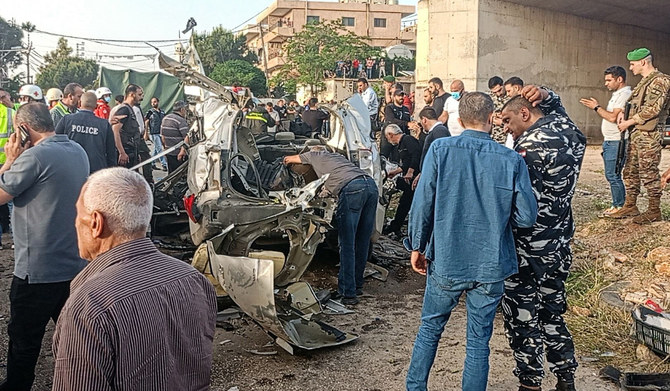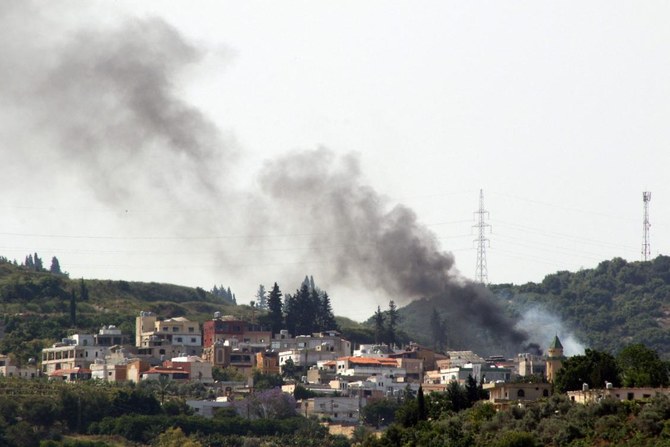BEIRUT: Two children from a Syrian refugee family and a Hezbollah fighter were killed when Israeli airstrikes on Friday hit an area of southern Lebanon more than 30 km inside the border.
Israeli strikes targeted Najjariyeh and Addousiyeh, adjacent villages south of the coastal city of Sidon, killing the children and a Hezbollah fighter driving a pickup truck.
Hezbollah responded to the raids by firing dozens of rockets toward the upper Galilee, western Galilee, the Galilee panhandle, and the Golan.
Israeli media claimed that 140 rockets were fired toward the north of the country.
BACKGROUND
Hezbollah has traded cross-border fire with Israeli forces almost daily since the Oct. 7 Hamas attack on southern Israel that sparked the war in Gaza, now in its eighth month.
Israeli forces and Hezbollah have expanded their hostilities, with both launching drone attacks deep into Lebanese territory and northern Israel.
Retired Brig. Gen. Khaled Hamadeh of the Lebanese Army said that the situation in southern Lebanon is “escalating toward more violent attacks.”
Hezbollah insists on linking a ceasefire in southern Lebanon to an end to hostilities in Gaza.
Hamadeh said that no efforts were being made to stop the clashes between Israel and Hezbollah, unlike the situation in Gaza.
In a statement, Hezbollah said it targeted Israel’s Tsnobar logistics base in the Golan with 50 Katyusha rockets in response to the strike on Najjarieh.
According to Israeli media, rocket salvos were aimed at military bases in Katzrin and areas north of Lake Tiberias.
Two people were injured in rocket blasts in Karam bin Zamra in the upper Galilee, media added.
CCTV cameras installed outside homes in Najjarieh showed an Israeli drone following the pickup truck as the driver, named as Hussein Khodor Mehdi, attempted to flee.
The first missile launched by the drone missed its target, but a second that struck the truck, setting it on fire and killing the driver. Three onlookers were also injured.
Hezbollah said that Mehdi, 62, was “martyred on the road to Jerusalem.”
Israeli Army Radio said the victim was a senior commander in the Hezbollah air force.
It claimed that the army planes shelled Hezbollah’s infrastructure in Najjarieh.
The second airstrike targeted a congregation hall and a cement factory, wounding several members of a Syrian refugee family. Two children, Osama and Hani Al-Khaled, later died from their injuries.
Hezbollah said it targeted the Al-Raheb military site with artillery and Israeli positions in Al-Zaoura with a salvo of Katyusha rockets.
According to a security source, Hezbollah’s latest targets included surveillance balloons near Tiberias and Adamit in the Galilee.
Early on Friday, Hezbollah attacked the newly established headquarters of the 411th Artillery Battalion in Kibbutz Jaatoun, east of Nahariyya, with drones in response to the Israeli killing of two Hezbollah fighters, Ali Fawzi Ayoub, 26, and Mohammed Hassan Ali Fares, 34, the previous day.
In his Friday sermon, Sheikh Mohammed Yazbek, head of Hezbollah’s Shariah Council, said the group was “waging its fierce war on the north of Palestine, pursuing the enemy, blinding its espionage, and breaking what were once red lines, as well pursuing its soldiers in their hideouts until the war on Gaza stops.”
The US Embassy in Lebanon issued a warning over the conflict on the southern border and the presidential vacuum in the country.
Electing a president was crucial to ensuring Lebanon’s participation in regional discussions and future diplomatic agreements concerning its southern border, the embassy said.
Lebanon “needs and deserves a president who unites the nation, prioritizes the well-being of its citizens, and forms a broad and inclusive coalition to restore political stability and implement necessary economic reforms,” the statement added.
The ambassadors of Egypt, France, Qatar, Saudi Arabia, and the US to Lebanon issued a statement this week warning of “the critical situation facing the Lebanese people and the difficult-to-manage repercussions on Lebanon’s economy and social stability due to the delay of necessary reforms.”

























